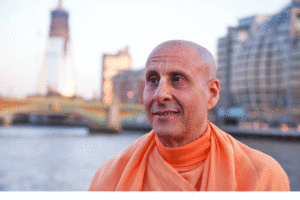Can You Be Spiritual without Being Religious?
SPIRITUALITY, 24 Jun 2019
Radhanath Swami – TRANSCEND Media Service
Is it necessary to equate spirituality with religion? Can people be spiritual, have values, but not be religious at all?
It depends on our definition of spirituality and religion. Values are required to be genuine in any spiritual or religious path. In the yoga system there are yamas and niyamas which are based on our values, on our ethics, on our morality, because we can’t truly build our spiritual experience unless we have those values. When we see a religion or spiritual path without those values in it, we often turn away from that religion or spirituality – whatever we may call it. So those values are necessary.
The universal character of anyone on any religious or spiritual path – if they are really doing it right, in a deep meaningful way – is that they are going to have common characteristics and values that are universal; compassion, honesty, self-control, generosity, wisdom, and insight. Whether one is a Christian, Muslim, Jew or Hindu, or whatever, these are the common values we find in the scriptures and in the lives of the saints. The realized person or saint could be a mother with three children, or a monk who is traveling around and preaching.
Our actual spiritual identity beyond birth and death, a path that brings us to that internal ecstatic love, love for God and all beings, is within us. The values we live by – without that connection – don’t bring us to the same depth beyond birth and death as a deep spiritual path does.
If you consider religion a sectarian concept of spirituality, then yes, it could be a disturbance. But true religion is that essential spirituality that brings our compassion to a deep place – to the body, to the mind and also to the true self within others. One can have a value based moral life without the concept of true religion or true spirituality: be a good person, be more peaceful, be more pious, and everything else, but to actually reach that depth of our souls, to be instruments of that compassion, and to realize ourselves beyond the mortality of these vulnerable little bodies and minds of ours, for that we need a deep spiritual path.
So yes, we could be very good people, and we can make a difference. But you know, if we need to make that transcendental connection, it is important that we have what you may call religion – but without the sectarian conception.
________________________________________________________
Radhanath Swami is a Vaishnava sanyassin (a monk in a Krishna-bhakti lineage) and teacher of the devotional path of Bhakti-yoga. He is author of The Journey Home, a memoir of his search for spiritual truth, and the New York Times bestseller The Journey Within. His teachings draw from the sacred texts of India such as The Bhagavad-gita, Srimad Bhagavatam, and Ramayana, and aim to reveal the practical application of the sacred traditions, while focusing on the shared essence which unites apparently disparate religious or spiritual paths. Born Richard Slavin, on December 7, 1950, in his teens he came to confront a deep sense of alienation from suburban Chicago life and the civil injustices of mid-century America. At the age of nineteen, while on a summer trip to Europe, his internal struggles culminated in a commitment to search for God wherever it might lead him. Meditating on the Isle of Crete, he felt a supernatural calling and the next morning set off alone to find spiritual India. The Journey Home documents his odyssey as a penniless hitch-hiker though Greece, Turkey, Iran, Afghanistan, Pakistan and finally India. There he lived as a wandering ascetic, first amongst the forest dwelling Himalayan yogis and later amongst a wide variety of gurus and spiritual practitioners throughout India and Nepal. Ultimately, he was led to the holy town of Vrindavan, where he found the teacher he was searching for in A.C. Bhaktivedanta Swami Prabhupada (1896-1977) the founder of the International Society for Krishna Consciousness (ISKCON).
Go to Original – radhanathswami.com
Tags: Bhakti Yoga, Radhanath Swami, Religion, Spirituality
DISCLAIMER: The statements, views and opinions expressed in pieces republished here are solely those of the authors and do not necessarily represent those of TMS. In accordance with title 17 U.S.C. section 107, this material is distributed without profit to those who have expressed a prior interest in receiving the included information for research and educational purposes. TMS has no affiliation whatsoever with the originator of this article nor is TMS endorsed or sponsored by the originator. “GO TO ORIGINAL” links are provided as a convenience to our readers and allow for verification of authenticity. However, as originating pages are often updated by their originating host sites, the versions posted may not match the versions our readers view when clicking the “GO TO ORIGINAL” links. This site contains copyrighted material the use of which has not always been specifically authorized by the copyright owner. We are making such material available in our efforts to advance understanding of environmental, political, human rights, economic, democracy, scientific, and social justice issues, etc. We believe this constitutes a ‘fair use’ of any such copyrighted material as provided for in section 107 of the US Copyright Law. In accordance with Title 17 U.S.C. Section 107, the material on this site is distributed without profit to those who have expressed a prior interest in receiving the included information for research and educational purposes. For more information go to: http://www.law.cornell.edu/uscode/17/107.shtml. If you wish to use copyrighted material from this site for purposes of your own that go beyond ‘fair use’, you must obtain permission from the copyright owner.

Very well written! This message — and all other similar ones — need to spread more widely.